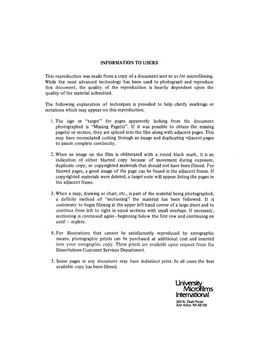| dc.contributor.author | Barbosa, David, | en_US |
| dc.date.accessioned | 2013-08-16T12:28:46Z | |
| dc.date.available | 2013-08-16T12:28:46Z | |
| dc.date.issued | 1982 | en_US |
| dc.identifier.uri | https://hdl.handle.net/11244/5045 | |
| dc.description.abstract | The study's findings, inferential, preliminary, and tentative, led to several basic conclusions. Among them were: (1) The case study approach is an effective research methodology for gathering data regarding the educational policymaking process. (2) Legislative policymaking is fought out at the level of personal and group strategems, as well as compromises based upon power coalitions of political, administrative, partisan and personal interests. (3) Party affiliation is an important determinant of voting behavior and educational policymaking. (4) Judicial decisions are significant forces in motivating State legislative bodies to establish certain educational policies. (5) Supportive legislators in powerful positions within the legislature are crucial agents in promoting educational policy initiatives. (6) Support of educational policy by the State's Education Commissioner is critical to policy adoption and adaptation in local school districts. (7) Educational policy which changes the existing, traditional, educational establishment will be challenged by its members. | en_US |
| dc.description.abstract | This study examined the history of The Bilingual Bicultural Act in the State of Colorado. Employing the case study method, the researcher ascertained the antecedents of the decisionmaking process which resulted in the establishment of bilingual education. Specifically, the study explored answers to the following questions: (1) What factors influenced legislators to enact a mandated bilingual education public policy in Colorado? (2) What, if any, evidence was available to determine the impact of bilingual education public policy in Colorado? (3) What factors influenced the legislature to repeal the mandated bilingual education public policy? | en_US |
| dc.description.abstract | The intent of the study was twofold: to trace the path of a particular policy initiative from its initial formulation to its repeal, and to verify something of the relevance and coherence of a conceptual framework concerning the public policymaking process. The researcher checked Rakoff and Schaefer's "A Model of the Policymaking Process." The researcher discerned the model's fit with the development, enactment, application and repeal of The Bilingual Bicultural Act. | en_US |
| dc.format.extent | xii, 265 leaves : | en_US |
| dc.subject | Education, Administration. | en_US |
| dc.title | A public policy analysis of bilingual education in Colorado. | en_US |
| dc.type | Thesis | en_US |
| dc.thesis.degree | Ph.D. | en_US |
| dc.thesis.degreeDiscipline | Jeannine Rainbolt College of Education | en_US |
| dc.note | Source: Dissertation Abstracts International, Volume: 43-09, Section: A, page: 2837. | en_US |
| ou.identifier | (UMI)AAI8302450 | en_US |
| ou.group | Jeannine Rainbolt College of Education | |
